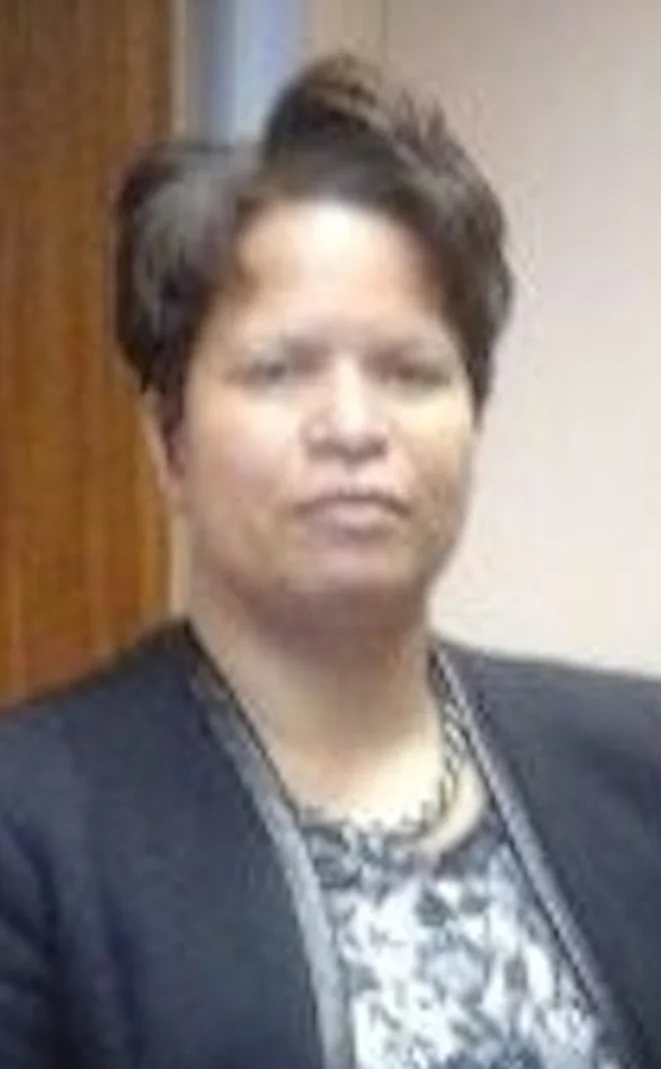Rochell Tersia Booysen
Photo from Rochell Booysen's LinkedIn page
“ “I wouldn’t have been able to manage without my mother””
Rochell, a “coloured” (as she describes herself) South African “from a very humble background” whose mother tongue is Afrikaans, “never had any ambition to join the defence force” but now finds herself as the Director Defence Commitments, providing Defence Minister Nosiviwe Noluthando Mapisa-Nqakula (who herself underwent military training in Angola and the Soviet Union in the 1980s) with legal and policy advice regarding troop deployment.
Of her family's five siblings, she's the sole girl and the only one to go to university, gaining a BA in Political Sciences and Government and then her BA Honours in Development Studies at the University of Johannesburg which she attended between 1989-1993. “This was the height of apartheid,” she tells me over coffee in the Institute of Higher National Defence Studies (IHEDN) in Paris where she was attending a 10-day Forum on the African Continent last week. “I was one of the 100 non-Whites in a 20,000-strong student body,” she explains, telling me how she'd become involved in student politics “to force the university to allow us to live on campus so that we didn't waste hours in travelling and were able to partake more fully in student campus life.” The result was rejection from her local community who accused her of being “too white” because she'd moved away.
After graduation, “the biggest challenge was to find a job.” Like many other graduates worldwide she got tired of hearing she was “too qualified with too little experience.” But with a baby girl to provide for she had to earn money so got work as a part-time teller in a supermarket. “That was so frustrating,” she sighs. “I was absolutely disillusioned because I'd hoped that my credentials would speak for themselves.”
But in June 1996 she applied for a graduate-level job at the Department of Home Affairs. She was interviewed by an all-White panel. “They were very tough,” she recalls, “and I really thought I'd failed after I snapped at them, but they were testing my resilience and told me they'd liked my reaction so could start the next morning.” She still looks surprised: “I was only 26, this was my first job and I was Head of Immigration!”
Discrimination in this job came not from the Whites and not particularly from men “but from my Black brothers and sisters who thought I was a 'tool of the enemy' and was working as an informant for the Whites.” Six months on, she threw in the towell “because the level of corruption was such that I couldn't stand it.” She'd also been offered a job by the head of the McDonald's fast food chain who'd been impressed by her whilst she was interviewing him for a business visa! “I did six weeks of training there, and didn't like it at all,” she laughs, “so I went back to my former job at the Department of Home Affairs.” Keeping an eye out for other opportunities, she applied for jobs at the Departments of Defence, Local Government and Housing. “Defence impressed me because they had really nice offices and were the first to offer me a job, so I took it.” She's been there since April 1997. Meanwhile she's also obtained a third degree, an LLB (Bachelor of Laws) specialising in Constitutional Law and Public International Law from the University of South Africa.
She began in Defence as a senior administrative officer in the Conventional Arms Control Directorate and by 2004 she'd been promoted to Deputy Director Defence Policy. She worked on ensuring the SADC (South African Development Community) Standy Force, one of the five that makes up the African Standby Force, became operational. She chaired the SADC legal military working group and acknowledges that at first she encountered “some resistance” from her male colleagues “but I speak from a knowledge base and with confidence, so I can stand my ground and not get emotional,” she remarks.
She's also the Chairperson of the Regulatory Framework Analysis Task Team which looks at all the legislation applicable to the defence function, and between 2010-13 was the Director of Conventional Arms Control. “That was politically very heavy,” she notes.
Rochell acknowledges that she wouldn't be where she is today if it hadn't been for her late mother, a nurse. “She was my hero,” she says, stopping suddenly as her voice breaks and her eyes fill with tears. “She always said that she wanted me to have a better future and she really invested in me and always encouraged me,” Rochell continues slowly. “I wouldn't have been able to manage without my mother,” she states simply. “She stayed with me for six months after the birth of my son and then whenever I travelled Granny was there. She played a very critical role.” As does “Auntie Violet” who “cooks, cleans and irons and has been with me since my son was born,” smiles Rochell.
So where next? Her daughter is adult, her son is 14 “and I'm now at the right age to take on an international posting,” she says. “I'm very passionate about peace-keeping and the role of women in peace-keeping,” she tells me so it seems logical that this is where we'll see this diplomatic, strong, articulate, small and confident woman who's “not as black as I thought I was” next.




